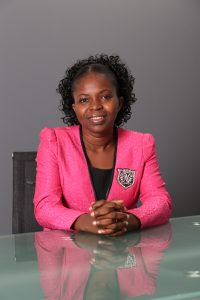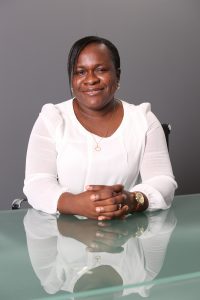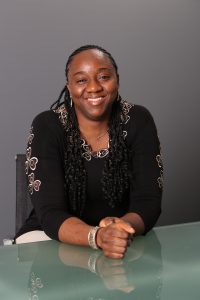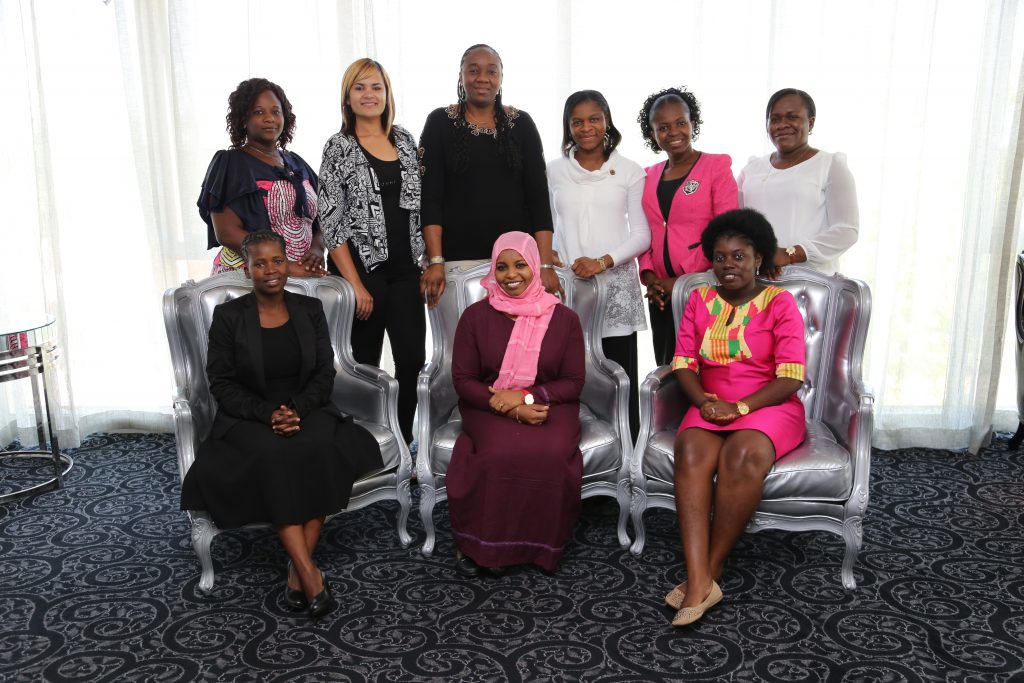Temitope Odetoye
In her postdoctoral fellowship at the University of Ilorin, Temitope Odetoye is investigating non-conventional agricultural residues of an under-utilised Nigerian plant, Parinari polyandra Benth, as a potential source of biomass feedstocks, for biodiesel and bio-lubricant production.
 “My work is on the utilisation of African biomass for the production of bio-fuel. This particular biomass I am working on is Parinari polyandra which is less utilised. It is not commonly used. What it what used for before is medicine. This particular fruit is common in the Middle East and West Africa, especially the northern part of Nigeria. I am working on how to make use of the oil. The oil content is about 60% and that is very encouraging. I want to make use of that for the preparation of biofuel and biolubricant. If I do this, it could be part of the solution to the environmental challenge we have of global warming and greenhouse gasses submission. By producing biofuel from this biomass, I believe it will be a solution to this problem.
“My work is on the utilisation of African biomass for the production of bio-fuel. This particular biomass I am working on is Parinari polyandra which is less utilised. It is not commonly used. What it what used for before is medicine. This particular fruit is common in the Middle East and West Africa, especially the northern part of Nigeria. I am working on how to make use of the oil. The oil content is about 60% and that is very encouraging. I want to make use of that for the preparation of biofuel and biolubricant. If I do this, it could be part of the solution to the environmental challenge we have of global warming and greenhouse gasses submission. By producing biofuel from this biomass, I believe it will be a solution to this problem.
“A couple of years ago in Nigeria, there was alarming flooding. And I was looking at it and thinking – am I going to be a part of the solution. I thought that it was better to have products that are environmentally friendly, green products from renewable material. I worked on this Parinari oil, I used it to prepare a polymeric substance used in the paint industry… that is a green product that is environmentally friendly. So I thought, if I am able to prepare something that is environmentally friendly that would be a way of contributing to society but also reducing the environmental harm of using fossil fuel, I can work on biofuel. A couple of years ago in Nigeria there was a time when we had a scarcity of fuel which was a terrible experience. Not having fuel for your car, even if you have the money… so I was thinking that we should have the foresight to make use of other, non-edible materials for the preparation of biofuel.
“The grant is really commendable and it comes in at the very right time as part of what I am going to do is carry out research on how we will extract the oil from Parinari and its reactions and assess the quality of the biofuel produced from this oil using different metals. With the grant we can do this, and actually plan to have a small-scale pilot plant and production of this biofuel. At the end of the research I want to have something I give to women to use as a source of income, to produce biofuel from Parinari.
“As a member of the association of professional engineers in Nigeria, we go out to the schools to give career talks to the girls, encouraging them to take up courses and we give them prizes for mathematics, physics, and other science subjects. I think when they see role models they get encouraged and I have even seen one or two of them come into my school, my department. They are taking up science and engineering courses.”
Temitope Sogbanmu
 Tempitope Sogbanmu is investigating the reasons why fish stocks are declining in the Lagos Lagoon, in her doctoral study at the Metals Metabolism Group in England. Her research covers the assessment of developmental effects and the carcinogenic potential of Polycyclic Aromatic Hydrocarbons and extracts of sediments taken from the Lagos Lagoon, using embryos of the African catfish and zebrafish.
Tempitope Sogbanmu is investigating the reasons why fish stocks are declining in the Lagos Lagoon, in her doctoral study at the Metals Metabolism Group in England. Her research covers the assessment of developmental effects and the carcinogenic potential of Polycyclic Aromatic Hydrocarbons and extracts of sediments taken from the Lagos Lagoon, using embryos of the African catfish and zebrafish.
“I’m currently in my last year of my doctoral research in the Kings College in London. My research centres around assessing the developmental and genotoxic effects of environmentally relevant concentrations of Naphthalene, Phenanthrene, Pyrene, Benzo(a)pyrene, and sediment extracts from the Lagos Lagoon.
“The topics I’ve researched cover monitoring, toxicological assessments and the management of pollution by crude oil and petroleum products, polycyclic aromatic hydrocarbons (PAHs), emerging environmental pollutants, volatile organic compounds, and printing effluents and organic pesticides in various environmental matrices.
“The promotion of best practices in environmental science in Nigeria is close to my heart. This is why I choose to engage in environmentally relevant studies while collaborating with other research professionals on overcoming issues linked to pollution. Promoting a culture of reading among the youth, and girls in particular, is another passion of mine. Annually, I donate books to children and youth organisations because I believe that by developing a habit of reading and studying, excelling in academics and inevitably science will be easier and more achievable for the youth.”
Oluwatoyin Adeleke
 Oluwatoyin Adeleke‘s passion is in pharmaceutical research specifically in drug delivery systems designed by pharmaceutical industrial pharmacists. Her research is currently focused on developing a patient-friendly drug delivery system in South Africa for the management of tuberculosis, which was recently revealed by Stats SA as the number one cause of death in the country.
Oluwatoyin Adeleke‘s passion is in pharmaceutical research specifically in drug delivery systems designed by pharmaceutical industrial pharmacists. Her research is currently focused on developing a patient-friendly drug delivery system in South Africa for the management of tuberculosis, which was recently revealed by Stats SA as the number one cause of death in the country.
“TB is a major problem is South Africa. The medicine we have available is not patient-friendly because you find patients taking around 12 tablets a day and even when they have to take fewer tablets, they are usually really big pills and they have to take for six to 12 months. So compliance is an issue.
“My focus is on looking at how to deliver anti-TB drugs in a more patient-friendly way. I would also like to see a change in the type of medication patients take, so rather than them taking so many, they would take one small tablet that is just as effective to enhance compliance. Another thing I’m focused on is kids infected with TB. You often find that there are few medicines for kids with TB and most of them end up having to take adult medication but in smaller doses, which is not very convenient for them. So I’m looking at developing readily available medication for kids in Africa.
“My love for chemistry inspired me to pursue a career in this industry. I remember growing up my father told me if I love it, I should go and do professional chemistry and tackle a male-dominated industry because there are few women in it. I researched pharmacy and saw that it suited me because I love people and I see myself solving at least one human issue in Africa.
“I intend to use the money from the L’Oréal-UNESCO grant for my research; to buy chemicals and a powerful computer and software that can assist with the work I do and enhance the quality of my pharmaceutical formulation.”

